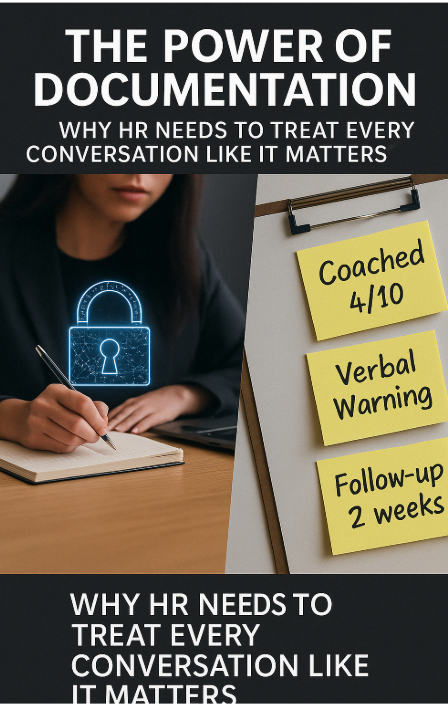The Power of Documentation
The Power of Documentation: Why HR Needs to Treat Every Conversation Like It Matters
When it comes to human resources, one golden rule reigns supreme: If it wasn’t documented, it didn’t happen.
Whether you manage a team of five or fifty, documentation isn’t just a nice-to-have—it’s a business necessity. It protects your business, supports fair treatment, ensures compliance, and strengthens your credibility as a leader. Yet so many business owners and even seasoned managers overlook it, especially when things seem to be "going fine."
Let’s break down why documentation is your secret weapon and how to build the habit without becoming a robot.
Why Documentation Matters
1. Protects Your Business Legally
If an employee files a complaint, disputes a termination, or alleges discrimination or unfair treatment, your documentation is your first line of defense. Clear, consistent notes showing what was said, when it was said, and what action was taken can mean the difference between resolution and a lawsuit.
2. Supports Fairness and Transparency
Documentation creates a level playing field. It prevents you from relying on memory (which is often biased or incomplete) and demonstrates that employees are treated consistently based on facts—not feelings.
3. Helps Track Performance Patterns
Noticing a slow decline in performance or repeated behavioral issues? A single bad day might not be a trend, but when you have notes from multiple touchpoints, patterns emerge. Documentation lets you coach smarter and decide when escalation is necessary.
4. Strengthens Progressive Discipline
Progressive discipline only works if each step is documented. Verbal coaching, written warnings, and final notices should all be logged with clear dates, expectations, and outcomes. This allows employees to understand what’s at stake and gives you a defensible record.
5. Reduces Miscommunication
Have you ever had an employee say, "You never told me that"? With a quick email recap or note in your HR system, you have a record of what was communicated. Documentation removes the ambiguity and helps reinforce expectations.
What Should You Document?
You don’t need to write a novel after every interaction, but here’s a smart list to keep in mind:
Performance discussions (positive and negative)
Attendance issues or tardiness
Policy reminders (especially after verbal conversations)
Behavioral concerns or complaints
Follow-ups on previous discussions
Any formal coaching, warnings, or write-ups
If it affects the employee’s ability to meet expectations or support the team, document it.
Tips for Documenting Effectively (Without Burning Out)
Use templates or checklists to streamline common types of notes.
Time-stamp everything and include who was present.
Stick to facts, not feelings. Write what happened, not what you think happened.
Follow up verbally documented conversations with a written recap. Even a quick email works.
Stay consistent. Don’t document just one person’s actions—make it a universal practice.
Common Mistakes to Avoid
Waiting too long. The details get fuzzy quickly.
Being too vague. "He was unprofessional" doesn’t hold up. "He raised his voice and interrupted multiple team members" does.
Using emotionally charged language. Keep your notes professional and fact-based.
Final Thoughts
Documentation is not about "catching" people—it’s about building clarity, accountability, and trust. When used consistently, it helps create a healthier workplace, supports your team’s growth, and protects your business when things go sideways.
Treat every conversation like it matters, because it does.
✅ Need Help Building Strong Documentation Habits?
At Purciarele Group, we help small businesses and nonprofit leaders build smart, sustainable HR practices that keep you compliant and culture-focused.
🎯 Whether you're updating your employee handbook, navigating a tricky disciplinary issue, or starting from scratch, we’ll help you document the right way.
📩 Let’s talk. Schedule a free consultation or email us at info@purciarelegroup.com to get started.
#HRStrategy #SmallBusinessHR #EmployeeRelations #ProgressiveDiscipline #PurciareleGroup #ComplianceMatters #WorkplaceWellness




Comments
Post a Comment